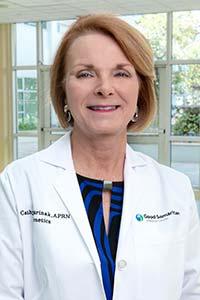Considerations for Genetic Testing
Do you or a close blood relative (sibling, half-sibling, parent, child, aunt/uncle, niece/nephew, grandparent or grandchild) have any of the following?
Breast/Ovarian/Pancreatic/Prostate Cancer
- Ovarian cancer
- Early-onset breast cancer (45 or younger)
- Triple-negative (ER-, PR-, HER2-) breast cancer at or before age 60
- Male breast cancer
- A family history of ovarian, breast, pancreatic, melanoma, or metastatic prostate cancer
- Breast or ovarian cancer and Ashkenazi Jewish ancestry
Colorectal Cancer
- Colorectal or uterine cancer diagnosed before age 50
- Multiple family members with colon or uterine cancer
- Tumors of the colon, rectum, uterus, stomach, ovary, pancreas, kidney, biliary tract, brain, small bowel or sebaceous gland in three or more relatives
- More than 10 colorectal polyps
- Colon tumor with abnormal gene testing
If you checked any boxes above, you should consider genetic testing.
Meet our Cancer Genetics Counselor
 Cathy Marinak, APRN, AOCNP
Cathy Marinak, APRN, AOCNP
Cathy is a native of West Palm Beach. She received her undergraduate degree from Vanderbilt University in Nashville, TN, and her graduate degree from Florida Atlantic University in Boca Raton FL. She has received advanced training in genetics from multiple
programs across the country. She has been board certified in Oncology since 1988. Beginning in 1998 with her master’s thesis, Cathy has been the recipient, or co-recipient of numerous grants from the Susan G. Komen Foundation. Most recently
Cathy was the recipient of an American Cancer Society grant the culminated with the development of a screening tool and pocket guide to help educate patients and providers alike about high risk features, and screening guidelines for colorectal cancer.
She also recently completed a quality of life study that evaluated the use of iPads with mindful meditation apps in the pre and post breast biopsy setting. Cathy has two adult daughters, and lives in Stuart with her husband.